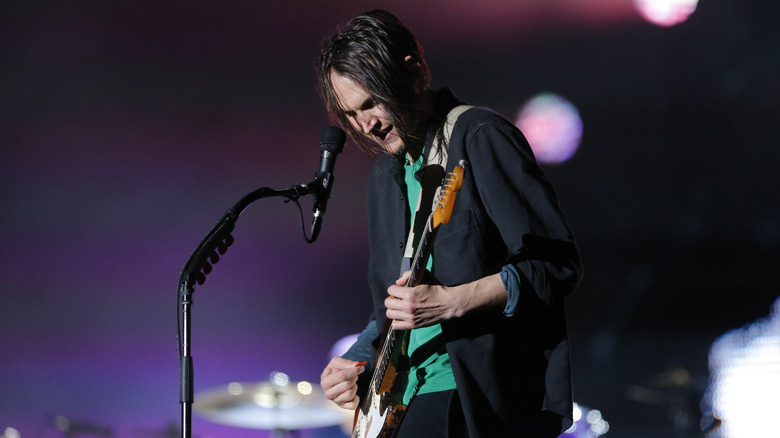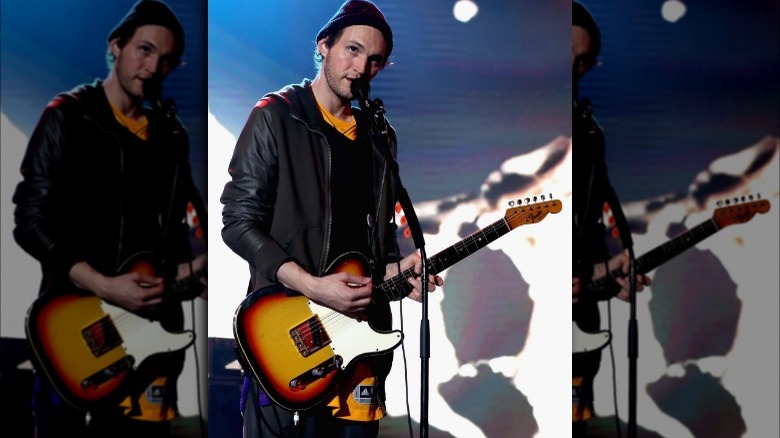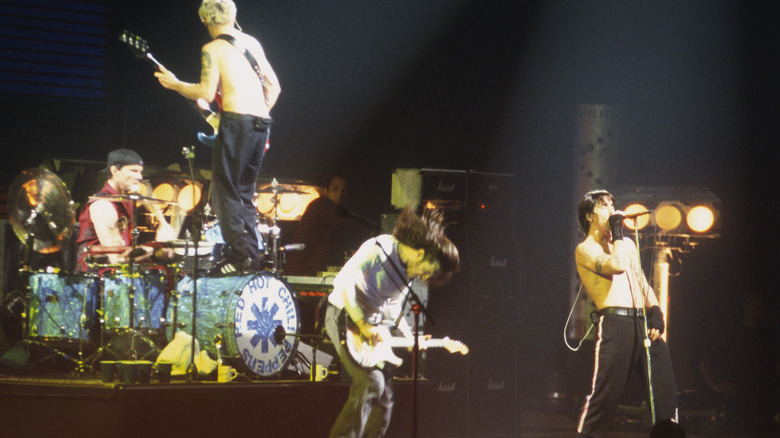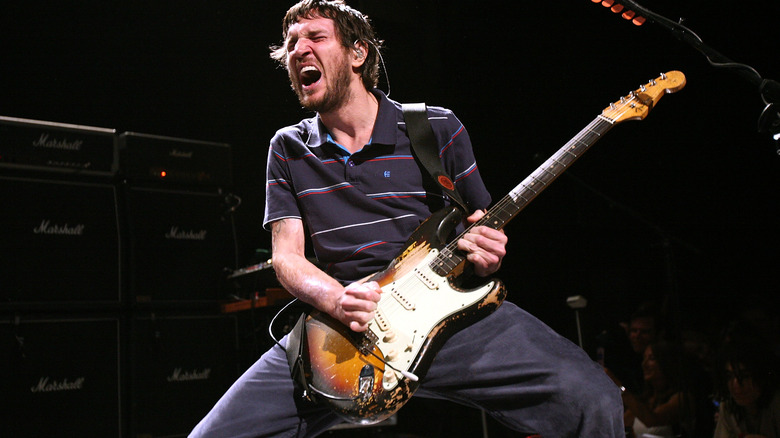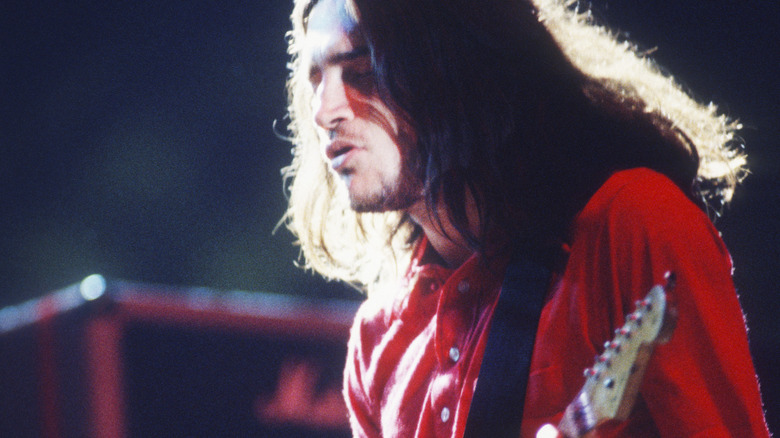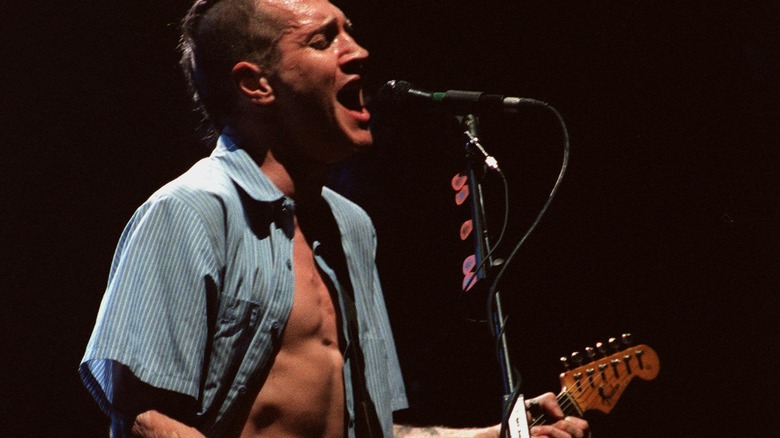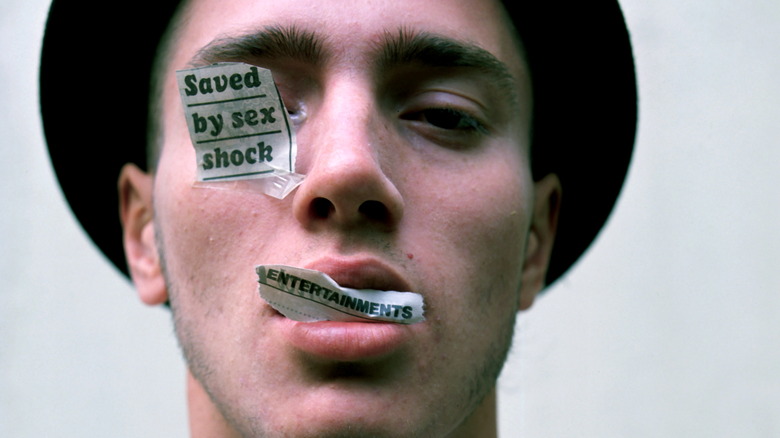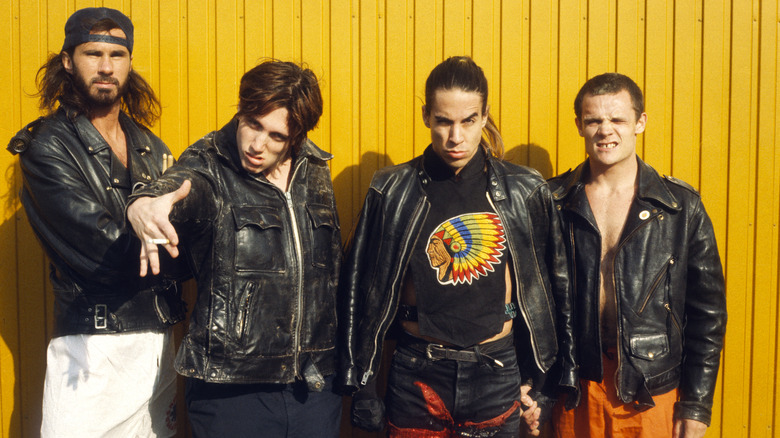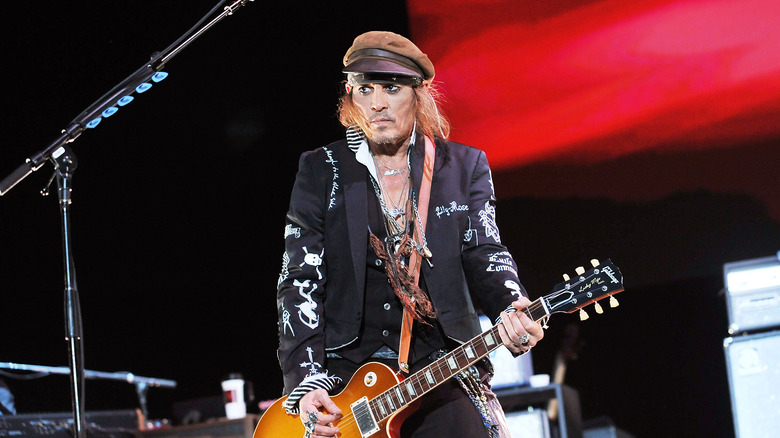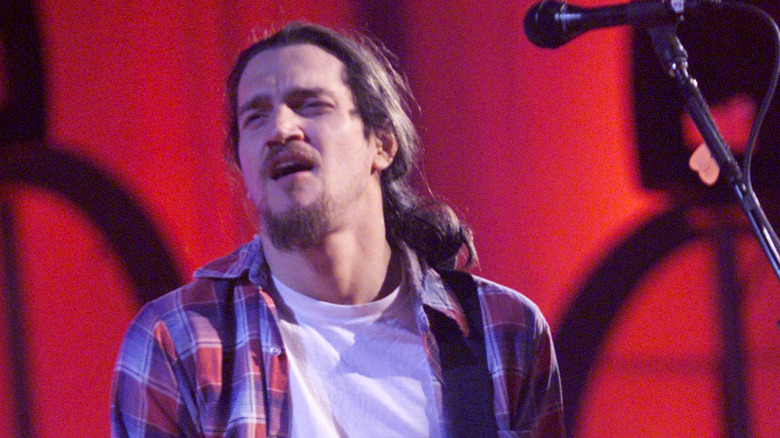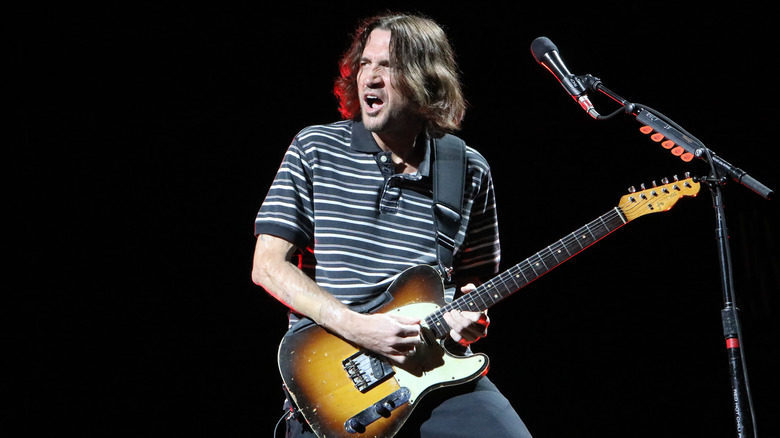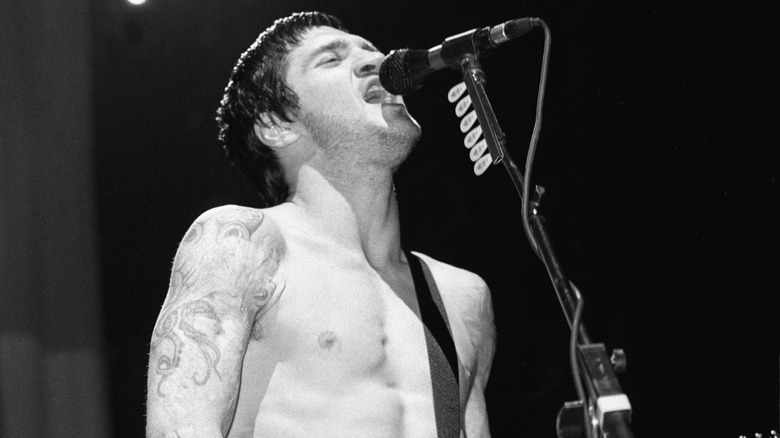John Frusciante: Get To Know The Guitarist For The Red Hot Chili Peppers
When it comes to alt-rock-soul-funk bands, the Red Hot Chili Peppers are by far the most famous and, according to many, make the best music. This gang has been superstars since their album "Blood Sugar Sex Magik" dropped in 1991, and, pending a horrific catastrophe that could only come about in a year like 2020, they're not going anywhere. (Hang on. It's almost over.)
The band has a unique model for acquiring guitarists: They hire so many of them you're never sure who is actually in the band on any given day. Dave Navarro joined their ranks in the mid-'90s. Josh Klinghoffer signed on for a decade, 2009-2019. Hillel Slovak (God rest his soul) was one of the founding members of the band and was around through their early years, before they reached the pinnacle of fame.
Then we come to John Frusciante. Good ol' John Frusciante, whom we could've thrown in pretty much anywhere along the lineup. Frusciante's history with RHCP has been so "on-again, off-again" it might make your head spin.
Frusciante couldn't handle the fame
After Red Hot Chili Peppers' original guitarist, Hillel Slovak, died from a tragic drug overdose, an 18-year-old John Frusciante took up his spot in the band. At the time, you probably wouldn't have caught the band's singles on the radio. The explosion into fame wouldn't come until "Blood Sugar Sex Magik," while Frusciante was still relatively new to the scene and definitely not ready for fame. He was barely into his 20s when that fame hit. "John would say, 'We're too popular. I don't need to be at this level of success. I would just be proud to be playing this music in clubs like you guys were doing two years ago,'" RHCP frontman Anthony Kiedis recalls in his memoir, "Scar Tissue."
Tensions were high for everyone in the band. The others had more experience being on stage, but everyone was new to fame; Frusciante was just feeling it the hardest. Kiedis, according to Diffuser, even thought the young guitarist was trying to sabotage the band when they appeared on "Saturday Night Live," because Frusciante couldn't bring himself to play or sing on key. Whether or not that was the case, Frusciante couldn't handle being with the band and quit in the middle of their Japanese tour, causing the band to cancel the remainder of that tour, along with their upcoming Australian tour.
Leaving the band led him down a drug-paved road
Now free from the band and with way too much time on his hands, John Frusciante had to find something to do. Like a rockstar, he turned to the lovely world of heroin addiction. It's not as though RHCP was exactly a sober band. Kiedis had his problems with substance abuse, as did other RHCP guitarists like Navarro and Slovak. And from the looks of it, Frusciante was heading down the same path that had taken Slovak's life a few years before.
"I tried to quit by taking speed and other stuff, then smoking crack and just taking heroin occasionally. I tried it by shooting coke. I knew I was going to die," Frusciante told The Guardian in 2003.
His drug use was so bad that by the time he got clean and rejoined the band in 1998 — they coincidentally had an opening after Navarro was booted for his drug issues — Frusciante's teeth fell out, requiring several thousands dollars' worth of dental repair. The young guitarist's drug overindulgence nearly cost him his life in five different overdoses, and it drove away his long-time friend, RHCP bassist (and former addict himself) Flea. At least, Frusciante got himself sober and was back in the band, although that only lasted until his second departure in 2009.
The guitarist rejoins RHCP yet again
In a "completely within his previously trended behavior" turn of events, John Frusciante rejoined RHCP yet again after leaving in 2009 to work on his solo project. The news of the several-times-former band member's return broke in 2019 in an Instagram post from Flea. The post showed a lot of love for now-former guitarist Josh Klinghoffer, who replaced Frusciante after the 2009 departure. "We also announce," the post goes on, "with great excitement and full hearts, that John Frusciante is rejoining our group."
The only time Frusciante has played with the band since leaving on his own ventures was during a benefit concert in 2016, according to Rolling Stone. Maybe that's when the spark of reunion first took hold. Or, maybe, it's simply a repeated pattern of destiny. Regardless, the majority of the band is focused on sobriety and living a healthy lifestyle at this point in their lives. That includes Frusciante, who (as far as we know) hasn't relapsed since rejoining the band in '98. Maybe this time Frusciante will stick around a while.
The aspiring musician was supported from the beginning
Years before John Frusciante became one of the best guitarists of Red Hot Chili Peppers, he was surrounded by parental figures that fully nurtured his love of music. Not only was his father a pianist trained at the Juilliard School of Music, but his mother also had similar aspirations to become a professional singer, yet ultimately chose to focus on her family instead. When talking about his son, John Frusciante, Sr., told the Sun Sentinel, "He grew up in an environment of music. Of course, it was different as far as genres were concerned."
Sadly, Frusciante's parents did not stay together for long. On the other hand, when his mother married again, his new stepdad was also behind him every step of the way in achieving his dream as Frusciante said to Guitar Player, "He really supported me and made me feel good about being an artist."
The encouragement the guitarist received from family throughout his youth was multigenerational as well. In Jeff Apter's "Fornication: The Red Hot Chili Peppers Story," Frusciante was spending time with his dad and grandpa before getting ready for a performance and revealed a heartwarming glimpse of his past when he said, "My grandfather hasn't seen me play guitar since we used to play Italian songs when I was 12 years old. I was so happy that my grandparents decided to come to the show."
The elder John Frusciante was a judge
After John Frusciante, Sr., graduated from the Julliard School of Music, he decided to take a different career path than the one he was on and his son would later follow. Instead of continuing as a pianist, he went to law school to become an attorney who later focused on cases involving child abuse and sex crimes both in private practice and as a prosecutor. Throughout these years he served as Assistant State Attorney and gained a reputation as an ardent defender of children's rights.
In 1990, Frusciante was elected as a Broward Circuit Judge with much support from the local law community and made a statement that he felt the key difference between himself and his opponent was that he refused to be an activist in the role, as reported by the Sun Sentinel. He then served on the bench in every division of the circuit for the following two decades until his resignation in 2010.
With such an accomplished career, Frusciante received much praise from attorneys in the area. The former president of the Broward County Bar Association, Christopher Neilson, said, "[He] is very conscientious, hard-working, intelligent, and a fair and even-handed judge" (via Boardroom Communications). Another attorney, Howard Talenfeld, who also served as president of a collective of child advocates known as Florida's Children First, appreciated Frusciante's dedication to the cause and said, "He cared so much about individual children and cases. He always saw the systemic problems and always brought the child welfare community together to solve them."
He dropped out of high school to pursue music
John Frusciante's true passion has been music for most of his life, but that was not the only reason why it became his entire focus as a teen. The guitarist despised his Californian hometown and could not wait to get out, as he admitted to Cream Magazine, "The Valley is the worst f****** place on the planet. Nothing but malls. Shopping is God. But I am glad I grew up there because I just locked myself in my room and played guitar" (via johnfrusciante.com).
The aspiring musician dropped out of high school the first chance he could and earned his GED instead. For this risky decision, Frusciante faced no opposition from his father who told the Sun Sentinel, "His music was what he wanted to do and that's what he did ... I'm not somebody who's going to tell my kids they should do this, they should do that."
By 17 years old, the guitarist was living on his own in Los Angeles and was supposedly taking classes at the Guitar Institute of Technology (GIT), now known as Musicians Institute (MI). However, according to Guitar Player, Frusciante claimed to have faked his attendance at the school even though MI still proudly promotes on their website that he went there in the late '80s.
He learned about the Red Hot Chili Peppers from a guitar teacher
Since John Frusciante was not one of the founding members of RHCP, he was still a young teen when he first learned of the band in 1984. For an interview exclusive to John Frusciante Online, the guitarist spoke with BBC journalist Dan Kramer and explained the interesting circumstances of the discovery when his guitar instructor was auditioning for the group to replace Hillel Slovak.
Unfortunately, the teacher did not make the cut to become the new guitarist, but once Frusciante was aware of the RHCP's existence, he checked them out on MTV and was highly impressed. He also admitted that initially he thought his teacher was trying to step in for Flea, which was a ridiculous idea in his mind once he had seen the band perform live. Frusciante said, "I was like, 'that guy can't be replaced,' it didn't make sense to me. And then I realized he was gonna play guitar, and I was like, 'that makes sense.'"
Johnny Depp helped create a documentary about his friend
John Frusciante hit the lowest point of his life after the first time he left RHCP. Over three years, he became a recluse who did not leave his home in the Hollywood Hills because of his severe heroin addiction, says Paper Magazine. Actor Johnny Depp and the frontman of the Butthole Surfers, Gibby Haynes, watched in horror as their friend slowly deteriorated before their eyes while they could do little to stop it.
In desperation, the duo directed a documentary in 1993 dealing with Frusciante's downward spiral to help their good friend when at his worst. The artsy — yet disturbing — film is difficult to watch, but it is speculated that Depp and Haynes made the piece called "Stuff" as an homage to a gifted musician who would not be in the world for much longer if he continued on his dark path (per filmslie.com).
He burned down his own house by accident
John Frusciante was in an extremely dangerous period of his life in between his first and second stints as the guitarist in RHCP. He nearly lost his life on more than one occasion, yet one of the most frightening events occurred not long after the "Stuff" documentary was filmed: He was almost burned alive within the disturbing house featured in the short movie.
In 1993, Frusciante accidentally set the home he lived in on fire, and even though he fortunately survived the flames, he did suffer severe burns as a result, according to Guitar World. However, the addiction of the struggling artist was so strong that the horrible series of events were the least of his concern. In an interview, he explained the crazy circumstances with his residence and said, "It burned down, then it was rebuilt, and then I moved into it, but I stopped paying for it. And eventually it was taken away from me. I almost saved it — my lawyer got me the money to get it back. But it was sold the day I got the money. That was fine with me, because that was 50,000 extra bucks I could spend on heroin" (via "Fornication").
The musician has an impressive solo career as well
Even though John Frusciante is mostly known as one of the guitarists in RHCP, he has also released a considerable number of albums on his own. As Paper Magazine points out, his solo work began during the toughest time of his life with "Niandra LaDes and Usually Just a T-Shirt" in 1995, followed by "Smile From the Streets You Hold" in 1997. From both albums, it is clear that the artist was greatly struggling at the time.
The situation improved dramatically for Frusciante once he returned to RHCP in 1998, including his individual career that completely took off a few years later. In less than two years from 2004 to 2005, the guitarist managed the impressive feat of releasing six solo albums, per "Fornication." He may have been off again and then back on again with his core band over the decades, yet continues to produce work under his own name, as well as with the pseudonym Trickfinger for his forays into electronic music (via AllMusic).
His new teeth cost $150,000
Years of severe heroin addiction took its toll on the body of John Frusciante, but thankfully, he managed to overcome his steep descent and successfully rehabilitate himself in 1998. However, significant damage had been done. In 1996, Robert Wilonsky of the New Times LA interviewed the guitarist and described his state at the time as if he was talking about a character from a horror story. He said, "[Frusciante's] upper teeth are nearly gone now; they have been replaced by tiny slivers of off-white that peek through rotten gums. His lower teeth, thin and brown, appear ready to fall out if he so much as coughs too hard. His lips are pale and dry, coated with spit so thick it looks like paste" (via "Fornication"). The editor also commented on how he was covered in burns, bruises, and scars, along with drops of blood on his khaki pants.
To repair the damage to his body, Frusciante not only needed skin grafts to cover the needle scars (via PaperMag), but even worse was that he had to replace his rotted out teeth with a set of dentures, or if he failed to do so, an infection could have easily ended his life. In the end, the new teeth cost a fortune at $150,000 (via "Fornication"). The guitarist's return to RHCP and the massive success of "Californication" shortly after would fund the dental and surgical work, but that was still a considerable sum of money for someone who was broke before rehab, especially when, as "Fornication" pointed out, the dentures were not even a perfect fit.
If you or anyone you know needs help with addiction issues, help is available. Visit the Substance Abuse and Mental Health Services Administration website or contact SAMHSA's National Helpline at 1-800-662-HELP (4357).
